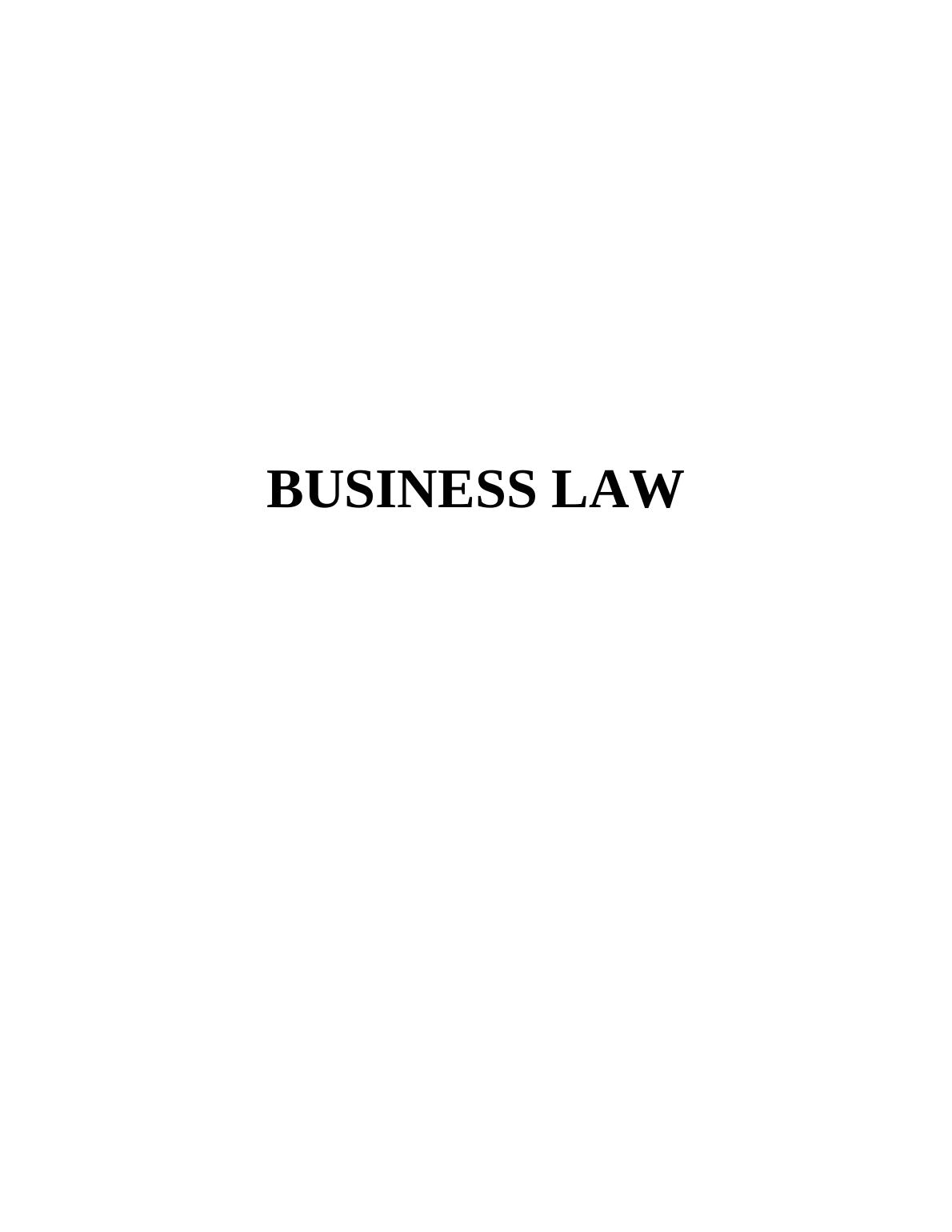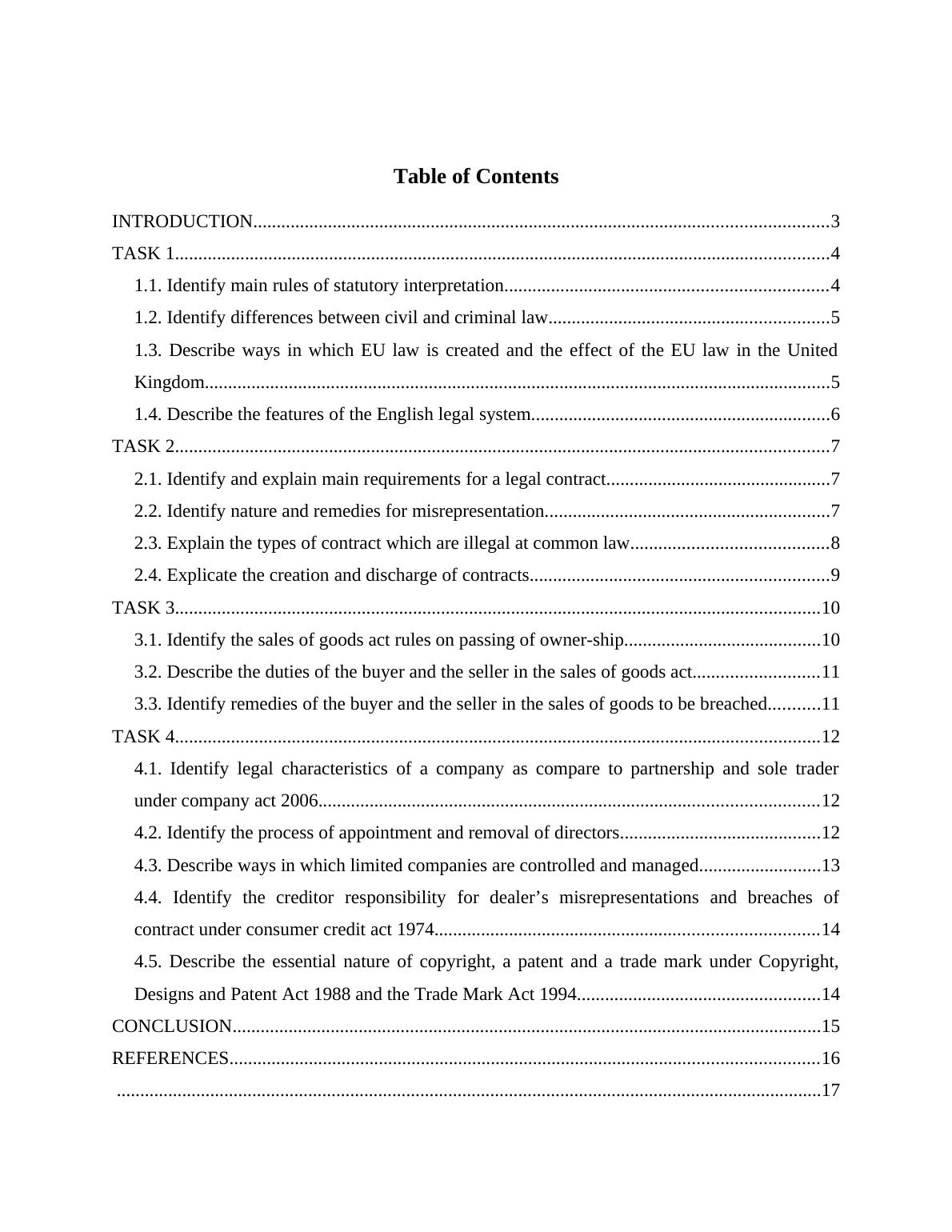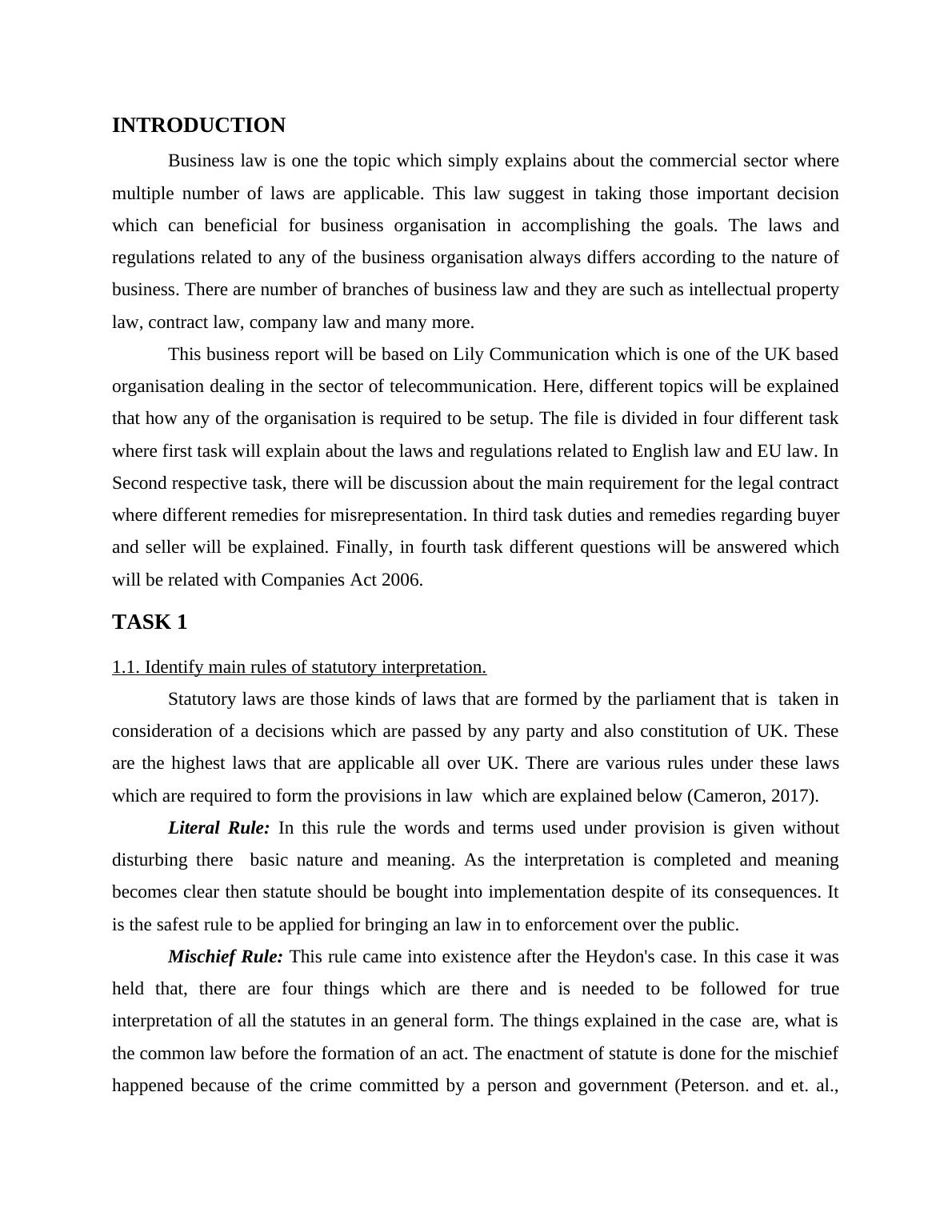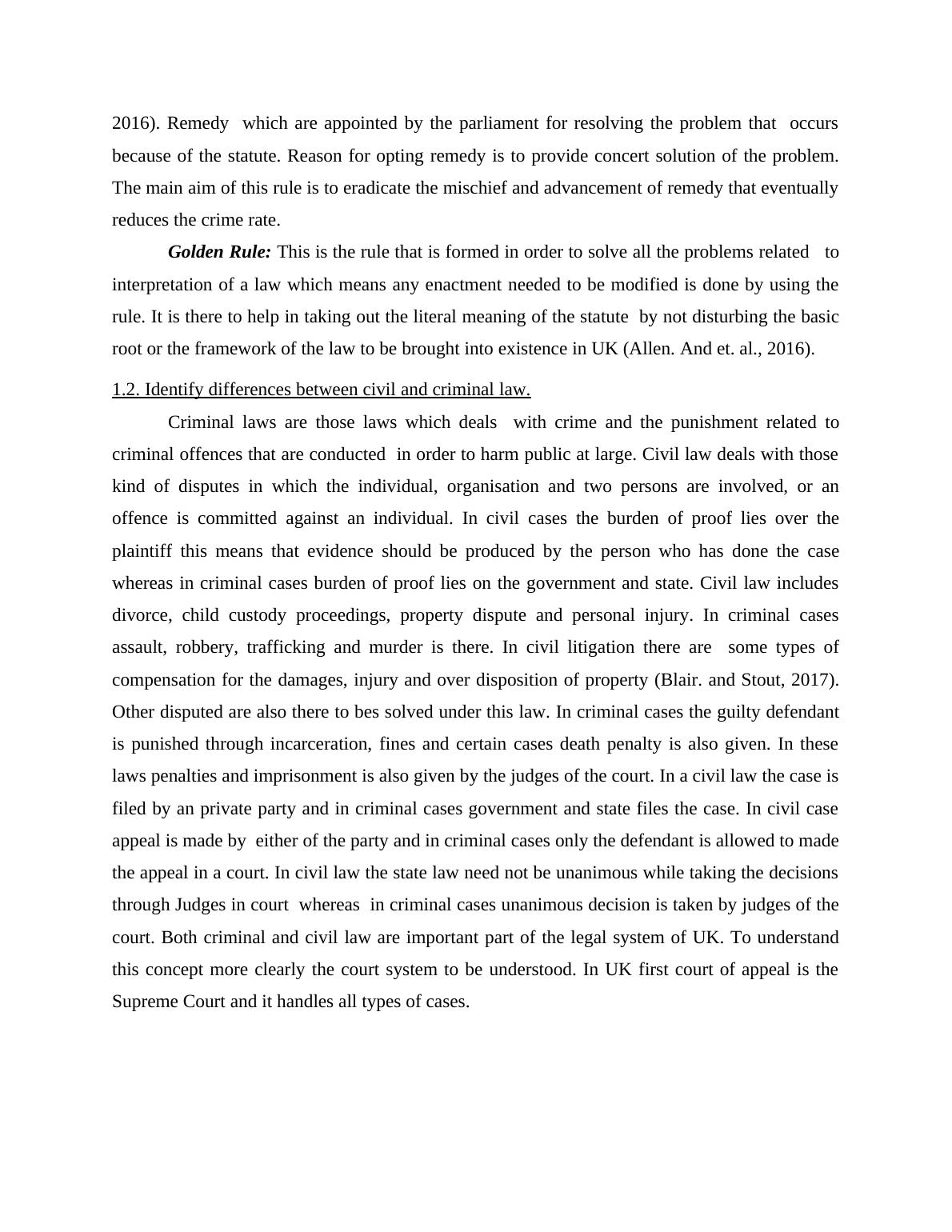Business Law: Rules of Statutory Interpretation, Differences between Civil and Criminal Law, Creation and Effect of EU Law, Features of English Legal System
Added on 2023-01-13
16 Pages6438 Words21 Views
BUSINESS LAW

Table of Contents
INTRODUCTION...........................................................................................................................3
TASK 1............................................................................................................................................4
1.1. Identify main rules of statutory interpretation.....................................................................4
1.2. Identify differences between civil and criminal law............................................................5
1.3. Describe ways in which EU law is created and the effect of the EU law in the United
Kingdom......................................................................................................................................5
1.4. Describe the features of the English legal system................................................................6
TASK 2............................................................................................................................................7
2.1. Identify and explain main requirements for a legal contract................................................7
2.2. Identify nature and remedies for misrepresentation.............................................................7
2.3. Explain the types of contract which are illegal at common law..........................................8
2.4. Explicate the creation and discharge of contracts................................................................9
TASK 3..........................................................................................................................................10
3.1. Identify the sales of goods act rules on passing of owner-ship..........................................10
3.2. Describe the duties of the buyer and the seller in the sales of goods act...........................11
3.3. Identify remedies of the buyer and the seller in the sales of goods to be breached...........11
TASK 4..........................................................................................................................................12
4.1. Identify legal characteristics of a company as compare to partnership and sole trader
under company act 2006...........................................................................................................12
4.2. Identify the process of appointment and removal of directors...........................................12
4.3. Describe ways in which limited companies are controlled and managed..........................13
4.4. Identify the creditor responsibility for dealer’s misrepresentations and breaches of
contract under consumer credit act 1974..................................................................................14
4.5. Describe the essential nature of copyright, a patent and a trade mark under Copyright,
Designs and Patent Act 1988 and the Trade Mark Act 1994....................................................14
CONCLUSION..............................................................................................................................15
REFERENCES..............................................................................................................................16
.......................................................................................................................................................17
INTRODUCTION...........................................................................................................................3
TASK 1............................................................................................................................................4
1.1. Identify main rules of statutory interpretation.....................................................................4
1.2. Identify differences between civil and criminal law............................................................5
1.3. Describe ways in which EU law is created and the effect of the EU law in the United
Kingdom......................................................................................................................................5
1.4. Describe the features of the English legal system................................................................6
TASK 2............................................................................................................................................7
2.1. Identify and explain main requirements for a legal contract................................................7
2.2. Identify nature and remedies for misrepresentation.............................................................7
2.3. Explain the types of contract which are illegal at common law..........................................8
2.4. Explicate the creation and discharge of contracts................................................................9
TASK 3..........................................................................................................................................10
3.1. Identify the sales of goods act rules on passing of owner-ship..........................................10
3.2. Describe the duties of the buyer and the seller in the sales of goods act...........................11
3.3. Identify remedies of the buyer and the seller in the sales of goods to be breached...........11
TASK 4..........................................................................................................................................12
4.1. Identify legal characteristics of a company as compare to partnership and sole trader
under company act 2006...........................................................................................................12
4.2. Identify the process of appointment and removal of directors...........................................12
4.3. Describe ways in which limited companies are controlled and managed..........................13
4.4. Identify the creditor responsibility for dealer’s misrepresentations and breaches of
contract under consumer credit act 1974..................................................................................14
4.5. Describe the essential nature of copyright, a patent and a trade mark under Copyright,
Designs and Patent Act 1988 and the Trade Mark Act 1994....................................................14
CONCLUSION..............................................................................................................................15
REFERENCES..............................................................................................................................16
.......................................................................................................................................................17

INTRODUCTION
Business law is one the topic which simply explains about the commercial sector where
multiple number of laws are applicable. This law suggest in taking those important decision
which can beneficial for business organisation in accomplishing the goals. The laws and
regulations related to any of the business organisation always differs according to the nature of
business. There are number of branches of business law and they are such as intellectual property
law, contract law, company law and many more.
This business report will be based on Lily Communication which is one of the UK based
organisation dealing in the sector of telecommunication. Here, different topics will be explained
that how any of the organisation is required to be setup. The file is divided in four different task
where first task will explain about the laws and regulations related to English law and EU law. In
Second respective task, there will be discussion about the main requirement for the legal contract
where different remedies for misrepresentation. In third task duties and remedies regarding buyer
and seller will be explained. Finally, in fourth task different questions will be answered which
will be related with Companies Act 2006.
TASK 1
1.1. Identify main rules of statutory interpretation.
Statutory laws are those kinds of laws that are formed by the parliament that is taken in
consideration of a decisions which are passed by any party and also constitution of UK. These
are the highest laws that are applicable all over UK. There are various rules under these laws
which are required to form the provisions in law which are explained below (Cameron, 2017).
Literal Rule: In this rule the words and terms used under provision is given without
disturbing there basic nature and meaning. As the interpretation is completed and meaning
becomes clear then statute should be bought into implementation despite of its consequences. It
is the safest rule to be applied for bringing an law in to enforcement over the public.
Mischief Rule: This rule came into existence after the Heydon's case. In this case it was
held that, there are four things which are there and is needed to be followed for true
interpretation of all the statutes in an general form. The things explained in the case are, what is
the common law before the formation of an act. The enactment of statute is done for the mischief
happened because of the crime committed by a person and government (Peterson. and et. al.,
Business law is one the topic which simply explains about the commercial sector where
multiple number of laws are applicable. This law suggest in taking those important decision
which can beneficial for business organisation in accomplishing the goals. The laws and
regulations related to any of the business organisation always differs according to the nature of
business. There are number of branches of business law and they are such as intellectual property
law, contract law, company law and many more.
This business report will be based on Lily Communication which is one of the UK based
organisation dealing in the sector of telecommunication. Here, different topics will be explained
that how any of the organisation is required to be setup. The file is divided in four different task
where first task will explain about the laws and regulations related to English law and EU law. In
Second respective task, there will be discussion about the main requirement for the legal contract
where different remedies for misrepresentation. In third task duties and remedies regarding buyer
and seller will be explained. Finally, in fourth task different questions will be answered which
will be related with Companies Act 2006.
TASK 1
1.1. Identify main rules of statutory interpretation.
Statutory laws are those kinds of laws that are formed by the parliament that is taken in
consideration of a decisions which are passed by any party and also constitution of UK. These
are the highest laws that are applicable all over UK. There are various rules under these laws
which are required to form the provisions in law which are explained below (Cameron, 2017).
Literal Rule: In this rule the words and terms used under provision is given without
disturbing there basic nature and meaning. As the interpretation is completed and meaning
becomes clear then statute should be bought into implementation despite of its consequences. It
is the safest rule to be applied for bringing an law in to enforcement over the public.
Mischief Rule: This rule came into existence after the Heydon's case. In this case it was
held that, there are four things which are there and is needed to be followed for true
interpretation of all the statutes in an general form. The things explained in the case are, what is
the common law before the formation of an act. The enactment of statute is done for the mischief
happened because of the crime committed by a person and government (Peterson. and et. al.,

2016). Remedy which are appointed by the parliament for resolving the problem that occurs
because of the statute. Reason for opting remedy is to provide concert solution of the problem.
The main aim of this rule is to eradicate the mischief and advancement of remedy that eventually
reduces the crime rate.
Golden Rule: This is the rule that is formed in order to solve all the problems related to
interpretation of a law which means any enactment needed to be modified is done by using the
rule. It is there to help in taking out the literal meaning of the statute by not disturbing the basic
root or the framework of the law to be brought into existence in UK (Allen. And et. al., 2016).
1.2. Identify differences between civil and criminal law.
Criminal laws are those laws which deals with crime and the punishment related to
criminal offences that are conducted in order to harm public at large. Civil law deals with those
kind of disputes in which the individual, organisation and two persons are involved, or an
offence is committed against an individual. In civil cases the burden of proof lies over the
plaintiff this means that evidence should be produced by the person who has done the case
whereas in criminal cases burden of proof lies on the government and state. Civil law includes
divorce, child custody proceedings, property dispute and personal injury. In criminal cases
assault, robbery, trafficking and murder is there. In civil litigation there are some types of
compensation for the damages, injury and over disposition of property (Blair. and Stout, 2017).
Other disputed are also there to bes solved under this law. In criminal cases the guilty defendant
is punished through incarceration, fines and certain cases death penalty is also given. In these
laws penalties and imprisonment is also given by the judges of the court. In a civil law the case is
filed by an private party and in criminal cases government and state files the case. In civil case
appeal is made by either of the party and in criminal cases only the defendant is allowed to made
the appeal in a court. In civil law the state law need not be unanimous while taking the decisions
through Judges in court whereas in criminal cases unanimous decision is taken by judges of the
court. Both criminal and civil law are important part of the legal system of UK. To understand
this concept more clearly the court system to be understood. In UK first court of appeal is the
Supreme Court and it handles all types of cases.
because of the statute. Reason for opting remedy is to provide concert solution of the problem.
The main aim of this rule is to eradicate the mischief and advancement of remedy that eventually
reduces the crime rate.
Golden Rule: This is the rule that is formed in order to solve all the problems related to
interpretation of a law which means any enactment needed to be modified is done by using the
rule. It is there to help in taking out the literal meaning of the statute by not disturbing the basic
root or the framework of the law to be brought into existence in UK (Allen. And et. al., 2016).
1.2. Identify differences between civil and criminal law.
Criminal laws are those laws which deals with crime and the punishment related to
criminal offences that are conducted in order to harm public at large. Civil law deals with those
kind of disputes in which the individual, organisation and two persons are involved, or an
offence is committed against an individual. In civil cases the burden of proof lies over the
plaintiff this means that evidence should be produced by the person who has done the case
whereas in criminal cases burden of proof lies on the government and state. Civil law includes
divorce, child custody proceedings, property dispute and personal injury. In criminal cases
assault, robbery, trafficking and murder is there. In civil litigation there are some types of
compensation for the damages, injury and over disposition of property (Blair. and Stout, 2017).
Other disputed are also there to bes solved under this law. In criminal cases the guilty defendant
is punished through incarceration, fines and certain cases death penalty is also given. In these
laws penalties and imprisonment is also given by the judges of the court. In a civil law the case is
filed by an private party and in criminal cases government and state files the case. In civil case
appeal is made by either of the party and in criminal cases only the defendant is allowed to made
the appeal in a court. In civil law the state law need not be unanimous while taking the decisions
through Judges in court whereas in criminal cases unanimous decision is taken by judges of the
court. Both criminal and civil law are important part of the legal system of UK. To understand
this concept more clearly the court system to be understood. In UK first court of appeal is the
Supreme Court and it handles all types of cases.

End of preview
Want to access all the pages? Upload your documents or become a member.
Related Documents
Major Attributes of EU Law and English Legal Systemlg...
|20
|7828
|70
Analyse and advice on statutory provisions in business lawlg...
|17
|6159
|291
Analysis of Business Law Doclg...
|15
|4603
|31
Case Study on Business Law - Doclg...
|17
|5191
|33
Business Law Assignment - Sale of Goods and Supply of Serviceslg...
|14
|4706
|37
Laws and Legislations of Business : Reportlg...
|14
|5392
|89
